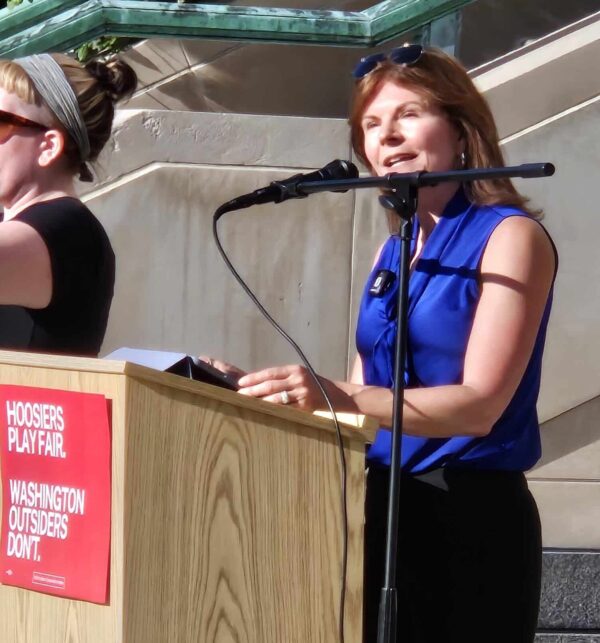
By Marilyn Odendahl
The Indiana Citizen
August 27, 2025
Comparing the growing dispute over mid-decade redistricting to a gunfight, Indiana Attorney General Todd Rokita released a statement Tuesday in support of redrawing the state’s congressional districts this year.
“I’m done bringing a knife to a gunfight against the aggressive, nonstop left-wing tactics,” Rokita said in his statement. “It’s time to fight on an even playing field and secure fair representation for our state.”

The state’s top lawyer announced his support of redistricting while Indiana Republican lawmakers were in Washington, D.C., for a meeting at the White House and shortly before Common Cause Indiana, MADVoters Indiana and Indiana Conservation Voters held a protest at the Statehouse against redrawing the maps. According to legislative leadership, members of Indiana’s GOP caucus discussed a range of issues with Trump administration officials, including education, energy, immigration, and reconfiguring the state’s congressional districts.
Julia Vaughn, executive director of Common Cause Indiana, described Rokita’s comments as “incredibly toxic” and said everyone on both sides of the issue should tone down their remarks about redistricting.
“This overheated rhetoric is going to destroy democracy and that’s one of the reasons why we have this redistricting arms race in various states jockeying to be the next one to gerrymander,” Vaughn said. “So, Attorney General Rokita’s statements don’t help anybody. They don’t help his party. They don’t help democracy. They certainly don’t help Hoosiers.”
At the urging of the Trump administration, Texas kicked off the push for a mid-decade redrawing of political maps and California is now attempting to create more safe Democratic seats to counter any Republican gains in the Lone Star State.
Indiana entered the fracas when Vice President JD Vance visited Gov. Mike Braun and Republican leaders at the Statehouse on Aug. 7. After the meeting, the governor confirmed redistricting was part of the discussion.
Currently, only two of Indiana’s nine congressional districts are represented by Democrats. Opponents of redistricting suspect President Donald Trump is pressuring the state’s GOP leadership to redraw the maps this year in order to enable Republican candidates to flip one or both of those blue seats to red in the 2026 mid-term election.
Usually, the legislature redistricts the political maps once every 10 years, after the U.S. Census is completed. The push to move the congressional district lines to favor Republicans mid-decade has been fueled by the president’s desire to keep his party in control of the U.S. House for the remaining years of his administration.
Rokita joins Lt. Gov. Micah Beckwith and Indiana Secretary of State Diego Morales who previously announced their support for mid-decade redistricting. However, a handful of Republican state lawmakers have openly opposed the idea and, following their meeting at 1600 Pennsylvania Ave., neither House Speaker Todd Huston, R-Fishers, nor Senate President Pro Tem Rodric Bray, R-Martinsville, have publicly endorsed redoing the congressional maps.
“All in all, I would consider the event extremely productive,” Bray said in a statement released Wednesday. “The White House recognized the way Indiana is leading the nation on issues like school choice, election security and fiscally responsible Medicaid reform. Indiana has strong alignment with the Trump Administration on these and other issues. While redistricting did come up and members were able to ask questions, we spent the bulk of our afternoon discussing issues like energy, immigration and preventing waste and fraud in government.”
Indiana Rep. Carey Hamilton, D-Indianapolis, said she was appalled by Rokita’s statement supporting redrawing the maps this year. Echoing Vaughn, she said the rhetoric around gerrymandering is reaching a “pitched level,” but she also pointed out that in this state, the last redistricting process in 2021 was controlled by Republicans using census numbers collected by a Republican administration.

“Republicans drew these maps,” Hamilton said. Rokita is making “a false argument and it’s not good for Hoosiers. We have real problems to solve for Hoosiers. This (redistricting) is not one of them.”
In his statement, Rokita justified the Hoosier State upending its congressional boundaries before the 2026 mid-term election by blaming the 2020 U.S. Census. He alleged the population count was “fundamentally flawed,” in part, because it included undocumented immigrants and skewed the results, especially in Democratic-controlled states like California.
“Noncitizens have no voice in electing our lawmakers in Washington, so using them to inflate congressional representation is not only unfair but also completely dilutes the voices of Hoosiers and American citizens,” Rokita said. “Rewarding states that violate federal law with sanctuary policies and actively act as a magnet for illegal aliens, pulling them into their communities, not only creates a perverse incentive but also punishes law-abiding states and erodes the integrity of our democratic process.”
However, immigrants, regardless of legal status, have always been included in the census.
The U.S. Constitution and the Census Act of 1790 require all persons residing in the United States – “excluding Indians not taxed” – be counted in the decennial census, according to the Lawyers’ Committee on Civil Rights Under Law. In 2020, the first Trump administration sought to omit noncitizens from that year’s census, but the Lawyers’ Committee successfully blocked the effort with a federal lawsuit pointing out that the Constitution’s Apportionment Clause of the Fourteenth Amendment mandates “counting the whole number of persons in each state” and does not expressly exclude undocumented immigrants. Also, the lawsuit highlighted the Census Act, which requires the U.S. Secretary of Commerce to administer the census and to report “the tabulation of total population by States.”
Trump is, again, trying to block undocumented immigrants from the census by recently ordering the Commerce Department to conduct a new count of the population. In a social media post, the president said the new census would use “results and information gained from the Presidential Election of 2024” and would not count “people who are in our country illegally.”
Rokita did explicitly back the president’s call to change the census, but he vowed to make sure any new maps the legislature passes will stand up in court.
“I strongly support efforts to move forward with redistricting Indiana’s federal congressional seats,” Rokita said. “As Indiana’s Attorney General, my office will be tasked with defending the maps passed by the General Assembly in court and, if passed, I am fully committed to ensuring those maps reflect the will of Hoosiers and withstand legal scrutiny.”
Indiana’s 2011 and 2021 congressional and legislative maps were drawn and passed by the Republicans in the Statehouse. Two reports analyzing Indiana’s legislative and congressional maps drawn by Republicans in 2011 and 2021 found “historically extreme levels of partisan bias” in favor of the GOP, compared to other states and Indiana’s own maps from previous decades. In the review of the 2021 map, the report’s author, Christopher Warshaw, political science professor at Georgetown University, concluded, “The partisan bias in these maps is likely largely due to intentional partisan gerrymandering designed to deprive some Indiana voters of their political voice.”
Pointing to the 2021 redistricting analysis, Hamilton said Rokita’s insinuation that Indiana’s current maps have been gerrymandered to give Democrats an edge in elections does not make any sense.
“Again, I have to repeat, Republicans drew Indiana’s maps,” Hamilton said. “They own these maps. They defended these maps, so to say they might be related to Democrats makes no sense at all. They were based on Trump’s census numbers.”
Dwight Adams, an editor and writer based in Indianapolis, edited this article. He is a former content editor, copy editor and digital producer at The Indianapolis Star and IndyStar.com, and worked as a planner for other newspapers, including the Louisville Courier Journal.
The Indiana Citizen is a nonpartisan, nonprofit platform dedicated to increasing the number of informed and engaged Hoosier citizens. We are operated by the Indiana Citizen Education Foundation, Inc., a 501(c)(3) public charity. For questions about the story, contact Marilyn Odendahl at marilyn.odendahl@indianacitizen.org.